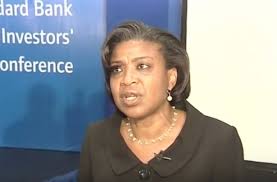The Debt Management Office (DMO) says Nigeria’s total public debt stock as at December 31, 2022 stands at N46.25 trillion (about $103.11 billion).
This is even as the African Centre for Leadership, Strategy and Development (Centre LSD) have tasked the incoming government on revenue generation to tackle Nigeria’s debt deficit.
The DMO in a statement on Thursday said the total public debt stock of the country consisted of the domestic and external debts of the Federal Government of Nigeria (FGN) and the 36 state governments and the Federal Capital Territory (FCT).
The new debt figure is a N6.66 trillion rise above the N39.59 trillion it was as at December 31 2021.
The DMO said in terms of composition, total domestic debt stock stood at N27.55 trillion (61.42 billion dollars), while total external debt stock was N18.70 trillion (41.69 billion dollar).
“Among the reasons for the increase in total public debt stock were new borrowings by the Federal Government and sub-national governments, primarily to finance budget deficits and execute projects.
“The issuance of promissory notes by the Federal Government to settle some liabilities also contributed to growth in the debt stock,’’ the office said.
It, however, said that on-going efforts by the Federal Government to increase revenue from oil and non-oil sources through initiatives like the Finance Acts and the Strategic Revenue Mobilisation Initiative are expected to support debt sustainability.
“Meanwhile, the total debt-to- Gross Domestic Product (GDP) ratio for December 31, 2022 was 23.20 per cent. It indicates a slight increase from the figure of December 31, 2021 at 22.47 per cent.
“The ratio of 23.20 per cent is within the 40 per cent limit self-imposed by Nigeria and the 55 per cent limit recommended by the World Bank/International Monetary Fund (IMF).
“It is also within the 70 per cent limit recommended by the Economic Community of West African States (ECOWAS),’’ DMO said.
This total public debt stock as released by DMO excludes the N22 trillion Federal Government’s indebtedness to the Central Bank of Nigeria (CBN), through Ways and Means advances.
The Ways and Means advances are presently awaiting securitisation by the National Assembly, and can only be added to the country’s public debt after such securitisation.
While charging the incoming government to pursue revenue generation aggressively at a one-Day Leadership and Development Policy Dialogue Series (LDPDS) with the theme “Nigerian Debt Sustainability Threat: Issues, implications, Lessons and Solutions for the Next Administration”, stakeholders said that Nigeria had to be deliberate with revenue generation to harness a balanced economy because currently, the revenue did not match the high debt servicing burden of the country.
Director, Portfolio Management Department of the DMO, Mr Dele Afolabi, in his presentation at the event said this is imperative since revenue pays debt because, according to him, “the more revenue you have ,the less you have to borrow going forward.”
He said although Nigeria had the highest Gross Domestic Product (GDP) in Africa, its government generated revenue to GDP ratio is lower than that of most African countries and this can be tackled through taxes among others.
According to him, “The people are not paying the right taxes ,we don’t have the right culture of taxation and revenue for the government. So, I think ,looking at the next government ,the key focus should be on how to grow government revenue.
“Most people really don’t pay taxes ,apart from people that receive salaries in the formal sector a lot of people are either not paying tax at all or not paying as they should ;so there are a lot of leakages in terms of government revenue.
“If we have the highest GDP in Africa, then we should also have the highest revenue but that is not the situation.’’
The Executive Director of Centre LSD, Mr Monday Osasah, said that the dialogue was imperative following the Federal Government outcry that Nigeria’s debt sustainability had become threatened following the recent rise in its revenue shortfalls.
Osasah said that according to the Minister of Finance, Nigeria is expected to spend 60 per cent of its total revenue on debt servicing in 2023 and this portended a grave threat to the economy.
He said, “According to Nigerian Bureau of Statistics (NBS) in its Nigerian domestic and foreign debt Q3 2022, Nigeria’s debt stock which includes external and domestic debt rose from N42.84 trillion or 103.31 billion dollars in the second quarter of the 2022 to N44.06 trillion or 101.91 billion dollars in the third quarter same year.
“The debt figure comprised the debt stock of the Federal Government, the 36 states and FCT.
“The burgeoning trend of our debt is worrisome especially when it is now being used for debt servicing rather than for growing and developing our infrastructure .’’
Osasah said that Nigeria’s debt service-to-revenue ratio is put at 83 per cent of quarter 3,2022 and the ratio had been on the rise as Nigeria faced a dwindling government revenue while government expenditures have increased.


